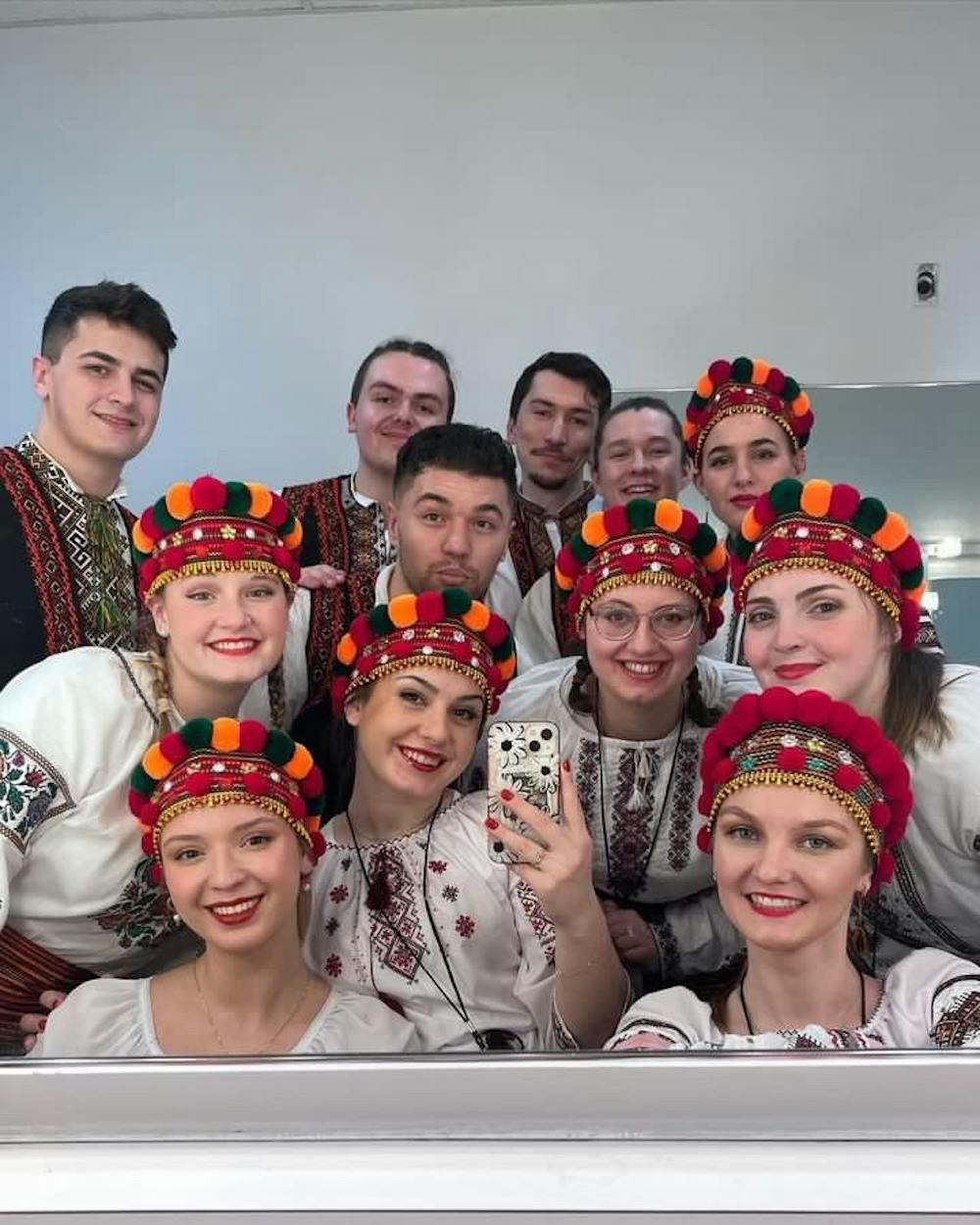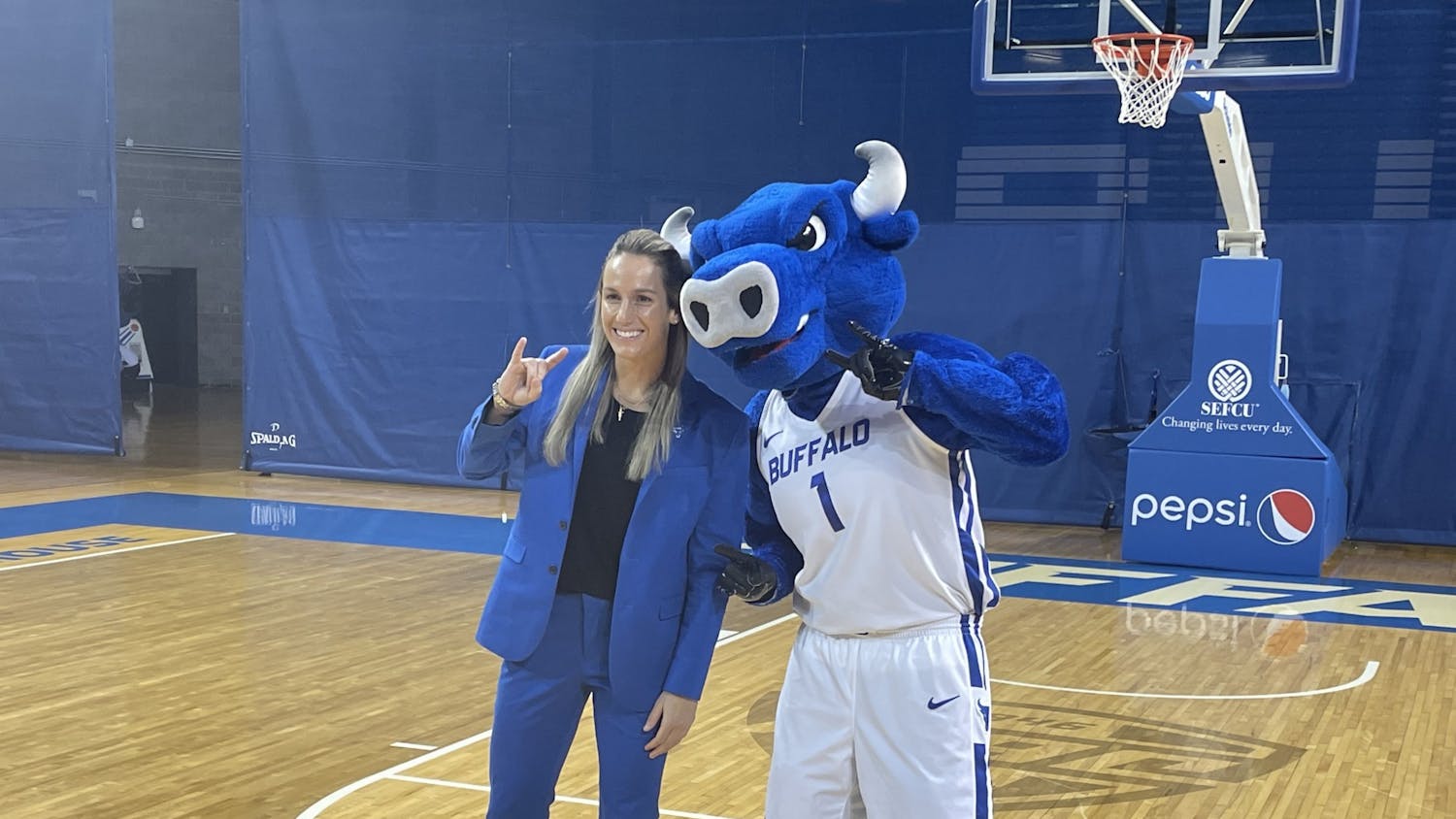Everything ached.
Sergey Romanyuk pondered this as he patrolled. One foot forward. Another foot in front.
The air nipped at his exposed face. A cotton beanie offered his head only a thin reprieve from the cold. He was otherwise clad in camouflage navy, tandem bands of blue and yellow emblazoned on his right shoulder.
Romanyuk walked purposefully. Elsewhere, distant artillery blotted the air with the echoes of explosions and screams.
Then something whistled above him.
He didn’t bother to look. After months of pulling distraught civilians from the rubble of their shattered homes and trading gunfire in the ashen husks of hospitals and elementary schools, he could tell what was coming.
It rifled into the ground as he grit his teeth, bracing for what would come next.
Silence.
He opened his eyes to a towering missile. It jutted out of the pavement a meter or so from his boots.
Romanyuk considered this thoughtfully. Then he lit a cigarette and reached into his vest.
Thousands of miles away in Buffalo, a phone buzzed.
Anna Klymkovych peered down in alarm and amazement.
She has since grown accustomed to such exchanges.
Horror
Klymkovych, a junior nursing and global affairs major, is part of a Ukrainian community at UB that has endured more than a year of agonized prayer for their loved ones after Russia launched its full-scale invasion of Ukraine on Feb. 24, 2022.
Though Klymkovych was born and lives in the U.S. with her parents and brothers, the rest of her family remains in the crosshairs of war. The junior has relatives residing throughout Ukraine, Russia and Crimea, a Ukrainian territory that was annexed by Russia in 2014.
Relatives living in Ivano-Frankivsk, a city in western Ukraine, had been the first to tip Klymkovych to the invasion after the city’s airport had been bombed.
Each day since has been haunted with fear for her loved ones, cornered overseas by the raging conflict, she says.
“There’s just this constant horror,” Klymkovych said. “Russia is bombing apartment buildings, they’re bombing daycares, they target places where people just want to buy food.”
She shuddered, recalling fears that family members, going hungry, would venture out and be killed in the earliest onslaughts of artillery.
“Going to UB during all of this was grueling,” she said. “Trying to deal with the fear that anything, anywhere could blow up at any point, and that I could lose more family members than I already had… it’s just horrifying.”
One of the most harrowing realities of war, Klymkovych says, is being unable to grieve together as a family in moments of loss.
Klymkovych’s aunt passed away in August 2022. She had been battling cancer, waiting in Crimea for her son to return from the frontlines of the war in Ukraine.
Months later, in November 2022, Klymkovych lost her grandmother after she suffered a stroke while traveling through Russia.
With travel restrictions leveled against American and Ukrainian citizens in Russia and Crimea, Klymkovych’s family couldn’t reconvene to grieve.
“It was hard… it was so hard,” she said. “I was barely handling the first loss. They were so recent to each other, what happened in August, and what happened in November. And there was nothing we could even really do about it.”
Heroiam slava
But Klymkovych feels most devastated for her cousin overseas.
Romanyuk had been fighting on the frontlines of the war when his mother — her aunt — had passed.
He had already been serving in the Ukrainian army before Russia invaded last February. But after hearing the news of his mother’s illness, Romanyuk had been counting down the days until his release from the army.
The first skirmish broke out between Russian and Ukrainian forces in Luhansk Oblast on Feb. 24, 2022 at 3:40 a.m., Kyiv time.
Romanyuk departed for the frontline.
“I had the most anxiety about my cousin at the beginning of the year because he was sent right back within those areas that were being bombed the worst to try to help fend off soldiers and get civilians out,” Klymkovych said.
The junior shares a special relationship with Romanyuk, who has known her since she was a baby. Though wary of making phone calls in light of security concerns, the pair keep in touch by texting each week.
“The first picture [he sent] was literally him with a missile about to fall right next to him,” Klymkovych said. “He decided to take a selfie with it and was like, ‘Oh, I’m still alive.’ And that’s my cousin for you. Very confident in himself. No fear.”
Nothing has changed since Klymkovych’s first memories with him, the junior says.
“He was always a really cool guy, that epitome of a guy who wears leather jackets and rides a motorcycle,” she said. “Everyone knew that he’d have their back. Whenever my grandma would need to lay down or whenever my grandpa would feel tired, he’d always offer to help milk the cows and take care of the chickens. He’d help as much as he could. It was never a question they needed to ask.”
News of Romanyuk’s mother’s passing wrenched Klymkovych’s heart. As an enlisted Ukrainian soldier, there had been no way for Romanyuk to return to Crimea before her passing.
Instead, he fought, she says, in hopes of one day recapturing the annexed territory and reuniting with his mother.
“He never got to say goodbye to her,” Klymkovych said. “It happened when he was on the frontlines, and it’s actually devastating to even see he wasn’t allowed to go bury her or even see her when she was sick in the hospital.”
If Romanyuk was shaken, he didn’t show it.
“My cousin was in shock. But I don’t really hear sadness much in his voice,” Klymkovych said. “I think men, especially in Ukraine, are raised where you don’t really show as much emotion or you try not to. He definitely tries his hardest to not show that it hurts him.”
The pair continued to chat, but they focused on other things. Klymkovych would ask him specifics about the war. Romanyuk would be happy to oblige.
Then in March, Romanyuk announced that he was being stationed further from the heat of battle. Klymkovych recalled the moment with relief but a pang of sorrow.
“Last time I spoke to him, he was telling me that ever since he was moved to the safer zones of Ukraine, it’s so calm and peaceful — even though there are still raid sounds,” Klymkovych said.
She continues to grieve, thinking back to what she might do differently if she could do it all again — to speak to them more often, to give each one a last hug.
“The saddest reality about that was that [my aunt] never reached out when she got sick. No one had any idea she was sick and in the hospital — no one in my family,” Klymkovych said. “To think that because of the situation and the annexation of Crimea, she was literally all alone the whole time. And most likely also in the time of her death.”
She echoed that sentiment about her grandmother, who had been traveling back and forth between America, Ukraine and Russia. Klymkovych cited her courage in trying to keep their family together during a time of war.
“My grandma was very brave,” Klymkovych said. “But I would have asked her not to go. I would have tried to convince her not to go back to Russia. I would have asked her to — I don’t know. I definitely would have tried to stress to her how much I loved her. I probably would have tried to say a more meaningful goodbye.”
Alive
Klymkovych says Friends of Ukraine, a student organization representing Ukrainian voices on campus, was a vital crutch to weather the emotional firestorm of the past year.
“I think a lot of people in the club will say that it definitely gave closure that you weren’t in this alone,” Kymkovych said. “There’s this big sense of community where everyone’s kind of just teary-eyed, exhausted, anxious, but still we’re all going through it together.”
Klymkovych serves as treasurer for Friends of Ukraine, which has held rallies and events throughout the past year in solidarity with Ukrainians overseas.
Although her immediate family members made it out of Ukraine alive, Antonina Bandrivska — a graduate student studying biological sciences who spoke at Friends of Ukraine’s first rally after Russia invaded — said the student organization has anchored her throughout the invasion.
“[Friends of Ukraine] is like a very big reason I’m still a normal person,” Bandrivska said. “It was a lifesaver, a breath of fresh air where we could all just come together. And not everyone there is Ukrainian — you can be from anywhere and have a lot of fun and be together.”
Earlier this semester, Friends of Ukraine participated in the 2023 International Fiesta. The competition represented a welcome reprieve for many club members, who had otherwise been otherwise inundated with news from the ongoing invasion, according to Eleanor Byrne, vice president of Friends of Ukraine.
“The Fiesta really brought the club together,” Byrne said. “We would practice five days a week, and it was a commitment. But in the end, everybody looked great. Everybody had fun. And that mattered a lot.”
Byrne, who had been adopted from Ukraine and arrived in the U.S. as a child, cites the club and events like International Fiesta as a cultural bridge for newcomers and those looking to learn more about their roots alike.
Roxy Tyminska, a senior psychology major and secretary of Friends of Ukraine, dedicates the club’s work in promoting Ukrainian culture to the efforts of soldiers battling to keep the nation afloat.
Tyminska, a roommate of Klymkovych, highlighted the struggles of Romanyuk and other fighters in Ukraine, including within her own family.
“All I can think of is my uncle and my peers right now fighting in the war,” Tyminska said.
Tyminska recounted the moment when her uncle, like Romanyuk, revealed he had been fighting on the frontlines of the invasion.
“When he finally did share that he was at the frontlines, he also shared that he was actually on the brink of dying. And hearing that over the phone…” Tyminska said. “We have our comfortable lives to live when there are those who are sacrificing their lives. We don’t have to think of stepping on something that will shred you to pieces.”
Tyminska says that continuing to exchange stories about the conflict is vital in highlighting the human toll of war — for all parties involved.
“It only makes people like me and my family hope that nobody will ever have to think about it in the future,” Tyminska said. “And to end this nightmare for the soldiers as soon as possible.”
Tyminska is defiant. The senior psychology major, citing incorrect early estimations of Ukraine’s fall, is convinced that her student organization will be able to continue spreading the culture of a nation still standing.
“Ukraine is still alive,” Tyminska said. “And as long as that is the case, we will showcase everything that Ukraine has to offer and show and be valued for.”
Kyle Nguyen is the investigative reporter and can be reached at kyle.nguyen@ubspectrum.com

Kyle Nguyen is a senior news/features editor at The Spectrum.





